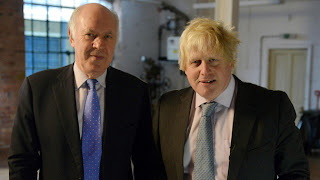The spotlight falls on Boris
Johnson tonight as Michael Cockerell’s documentary airs on BBC 2, and it has
already highlighted a few uncomfortable truths for the Mayor on the Andrew Marr
show preview.
Whatever you think about
Boris Johnson he has some great achievements to his name despite, or perhaps
because, he is such an extraordinary figure.
As is often the case with extraordinary people it is not necessarily a
good idea to copy them in your own quest for success. A generation of schoolboy cricketers, for
instance, was advised against trying almost anything they ever saw the
legendary Ian Botham do on a cricket field.
Arguably it would be
counter-productive to give Boris any kind of training, but a study of his
communication style does throw up a few nice examples of how not to do it – if you are anyone except
Boris. His use of negatives, for
instance, has been known to be so extreme that it resulted in an ‘award’ from the Plain English
campaign.
The principle here is that
negatives need to be avoided because they impede clear communication; any
sentence including a negative needs to be unscrambled before it can be properly
understood. If, for instance, I were foolish enough to give a tray of drinks to
a small child, I might say: “Don’t drop it”. The way their brain is going to interpret that information is as
follows: 1) Drop it – that’s the general concept, then 2) Don’t. By this time they have probably done exactly
what I told them not to do, because all the attention has been on
dropping. If, instead, I said: “Hold it
steady”, the instruction is immediately clear, there is a certain amount they
can actually do about it and they can certainly visualize what is
required.
The best example I have ever
see of this principle in action – because I saw the impact immediately - was
when my son received his half-term report.
It concluded: He is making every
effort to be efficient and well organised, not without success. My son was in tears; all he could see was
‘not’ and ‘without’, connected to the word success. His little 11-year old brain couldn’t or
wouldn’t unscramble the message to what his teacher meant, which was ‘with
success’.
Now look at the quote that
won Boris a rather dubious award:
I think he is saying that he agrees, but you have to unscramble and
unscramble to get through to the meaning.
One proviso I make to the
increasingly international make up of the business executives I coach in
presentation skills is that I believe this mis-use of negatives to be largely a British problem, that tends in
particular to afflict those who have been to English public schools and can’t
quite face up to saying what they actually mean. People, in fact, like Boris
who have trouble in saying what they really mean when continually asked questions
such as “Do you want to be Prime Minister”?
Extracted and adapted from Nick Fitzherbert's book Presentation Magic, published by Marshall Cavendish.


What a great presentation! I agree with you that each could be its own lesson for students and they would be engaging and fun! Actually, I start my next semester of courses in April and this would be a great introduction lesson to get my adult students speaking!
ReplyDeletepowerpoint presentations